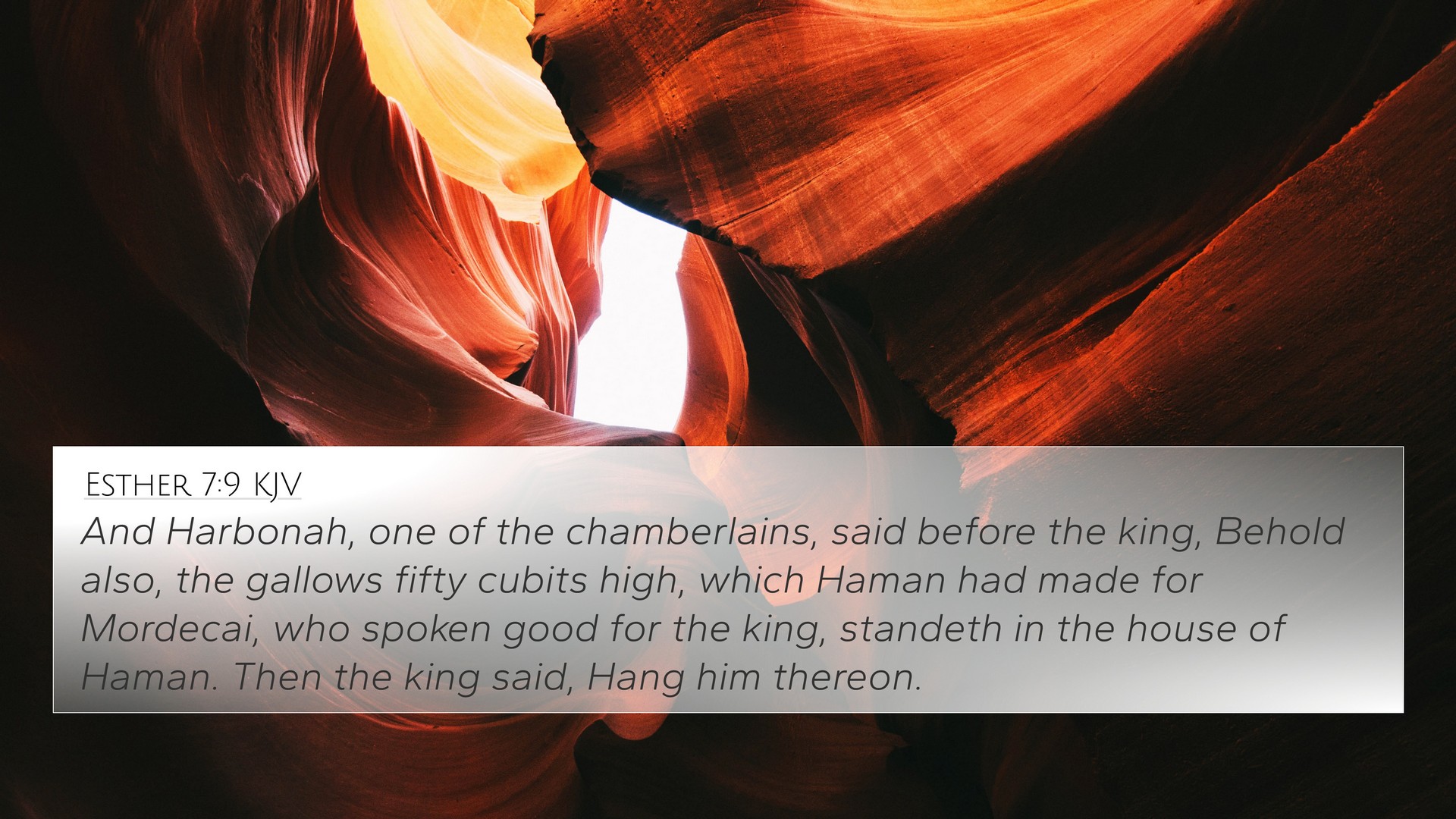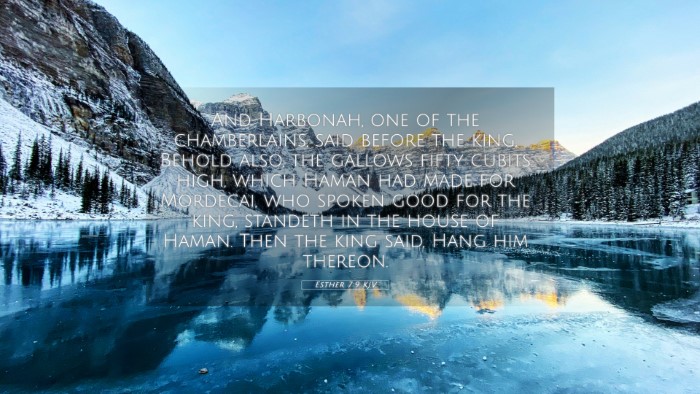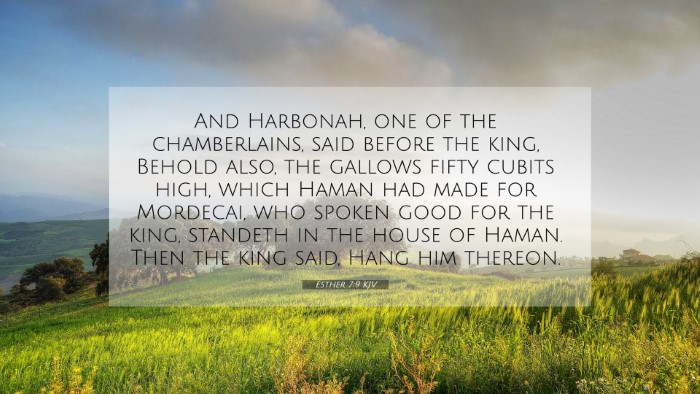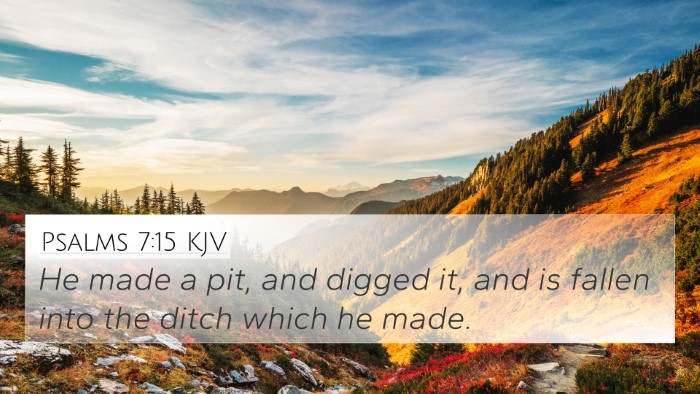Old Testament
Genesis Exodus Leviticus Numbers Deuteronomy Joshua Judges Ruth 1 Samuel 2 Samuel 1 Kings 2 Kings 1 Chronicles 2 Chronicles Ezra Nehemiah Esther Job Psalms Proverbs Ecclesiastes Song of Solomon Isaiah Jeremiah Lamentations Ezekiel Daniel Hosea Joel Amos Obadiah Jonah Micah Nahum Habakkuk Zephaniah Haggai Zechariah MalachiEsther 7:9 Similar Verses
Esther 7:9 Cross References
And Harbonah, one of the chamberlains, said before the king, Behold also, the gallows fifty cubits high, which Haman had made for Mordecai, who spoken good for the king, standeth in the house of Haman. Then the king said, Hang him thereon.
Uncover the Rich Themes and Topics of This Bible Verse
Listed below are the Bible themes associated with Esther 7:9. We invite you to explore each theme to gain deeper insights into the Scriptures.
Esther 7:9 Cross Reference Verses
This section features a detailed cross-reference designed to enrich your understanding of the Scriptures. Below, you will find carefully selected verses that echo the themes and teachings related to Esther 7:9 KJV. Click on any image to explore detailed analyses of related Bible verses and uncover deeper theological insights.
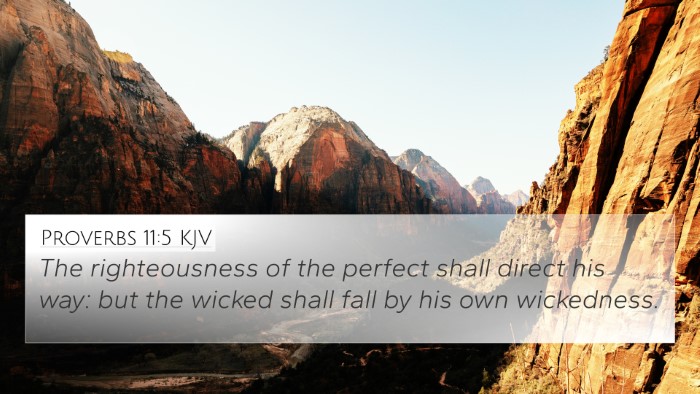
Proverbs 11:5 (KJV) »
The righteousness of the perfect shall direct his way: but the wicked shall fall by his own wickedness.
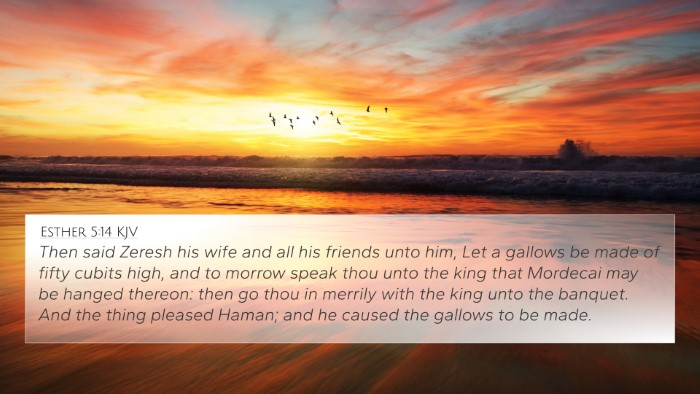
Esther 5:14 (KJV) »
Then said Zeresh his wife and all his friends unto him, Let a gallows be made of fifty cubits high, and to morrow speak thou unto the king that Mordecai may be hanged thereon: then go thou in merrily with the king unto the banquet. And the thing pleased Haman; and he caused the gallows to be made.
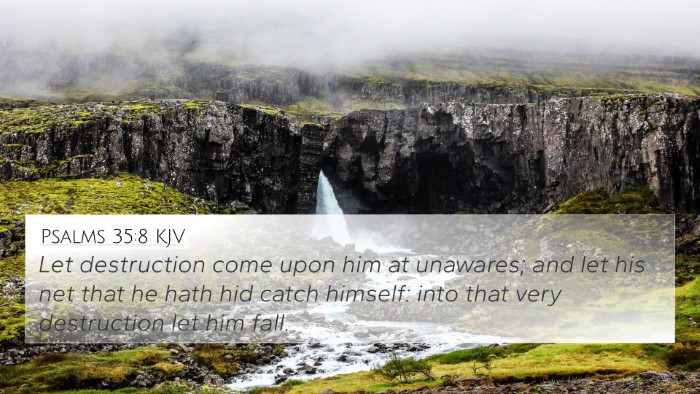
Psalms 35:8 (KJV) »
Let destruction come upon him at unawares; and let his net that he hath hid catch himself: into that very destruction let him fall.
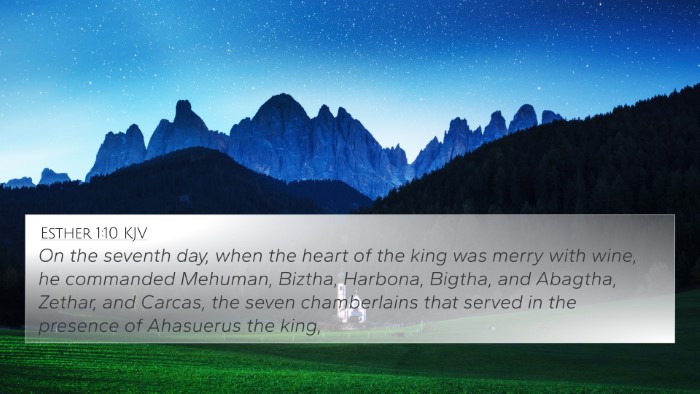
Esther 1:10 (KJV) »
On the seventh day, when the heart of the king was merry with wine, he commanded Mehuman, Biztha, Harbona, Bigtha, and Abagtha, Zethar, and Carcas, the seven chamberlains that served in the presence of Ahasuerus the king,

Psalms 37:35 (KJV) »
I have seen the wicked in great power, and spreading himself like a green bay tree.
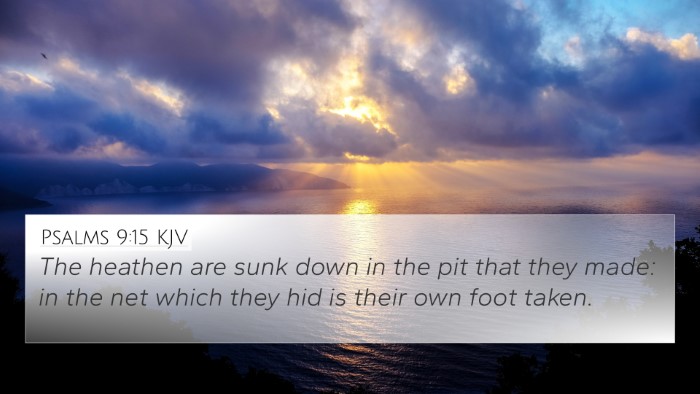
Psalms 9:15 (KJV) »
The heathen are sunk down in the pit that they made: in the net which they hid is their own foot taken.
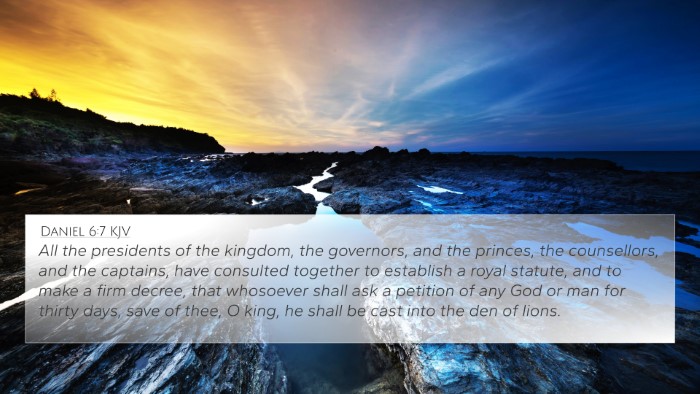
Daniel 6:7 (KJV) »
All the presidents of the kingdom, the governors, and the princes, the counsellors, and the captains, have consulted together to establish a royal statute, and to make a firm decree, that whosoever shall ask a petition of any God or man for thirty days, save of thee, O king, he shall be cast into the den of lions.
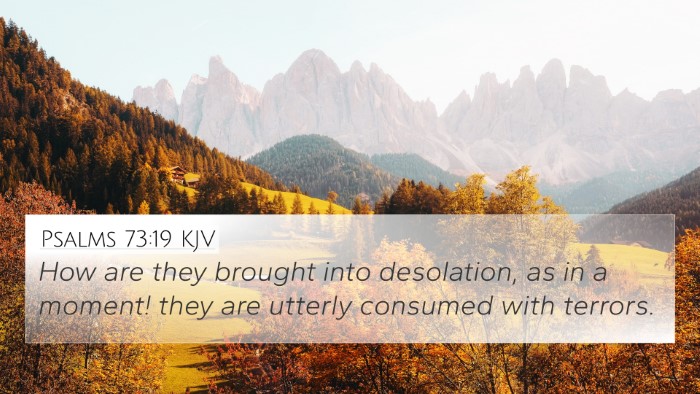
Psalms 73:19 (KJV) »
How are they brought into desolation, as in a moment! they are utterly consumed with terrors.

1 Samuel 17:51 (KJV) »
Therefore David ran, and stood upon the Philistine, and took his sword, and drew it out of the sheath thereof, and slew him, and cut off his head therewith. And when the Philistines saw their champion was dead, they fled.
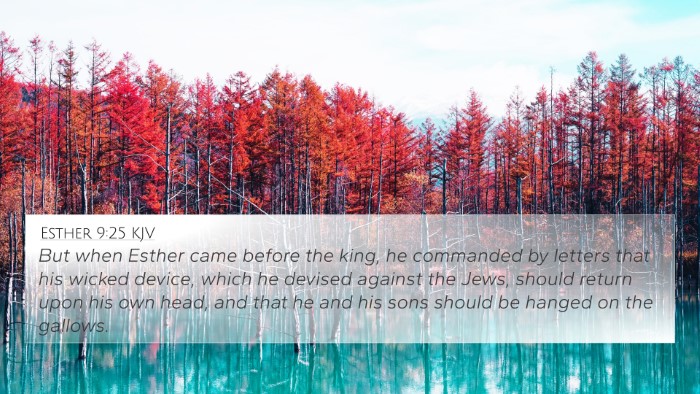
Esther 9:25 (KJV) »
But when Esther came before the king, he commanded by letters that his wicked device, which he devised against the Jews, should return upon his own head, and that he and his sons should be hanged on the gallows.
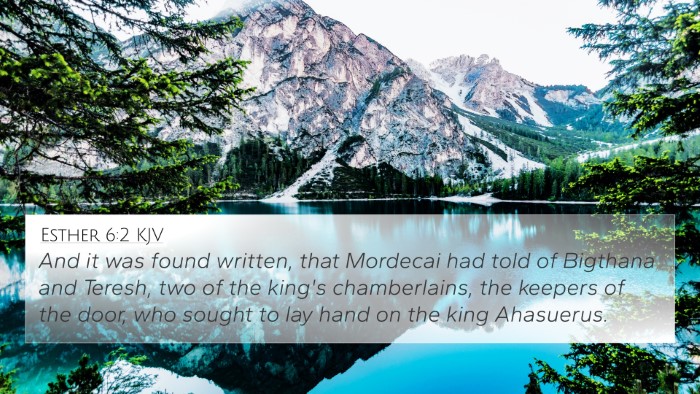
Esther 6:2 (KJV) »
And it was found written, that Mordecai had told of Bigthana and Teresh, two of the king's chamberlains, the keepers of the door, who sought to lay hand on the king Ahasuerus.
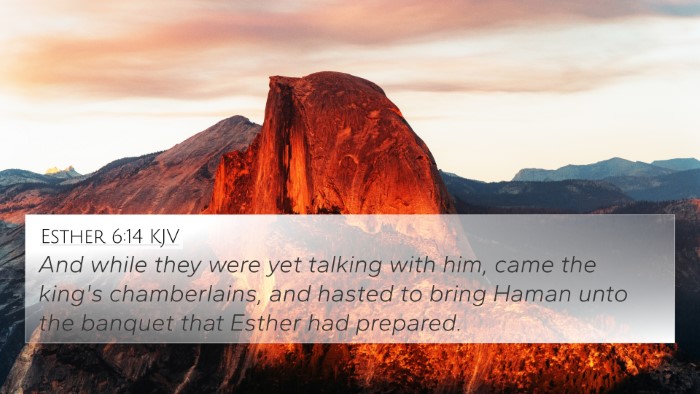
Esther 6:14 (KJV) »
And while they were yet talking with him, came the king's chamberlains, and hasted to bring Haman unto the banquet that Esther had prepared.
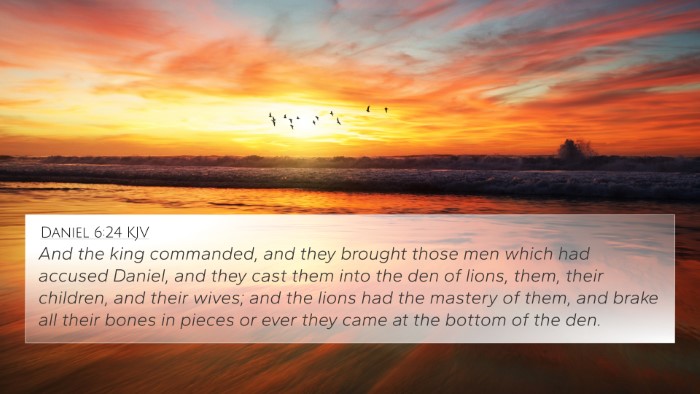
Daniel 6:24 (KJV) »
And the king commanded, and they brought those men which had accused Daniel, and they cast them into the den of lions, them, their children, and their wives; and the lions had the mastery of them, and brake all their bones in pieces or ever they came at the bottom of the den.
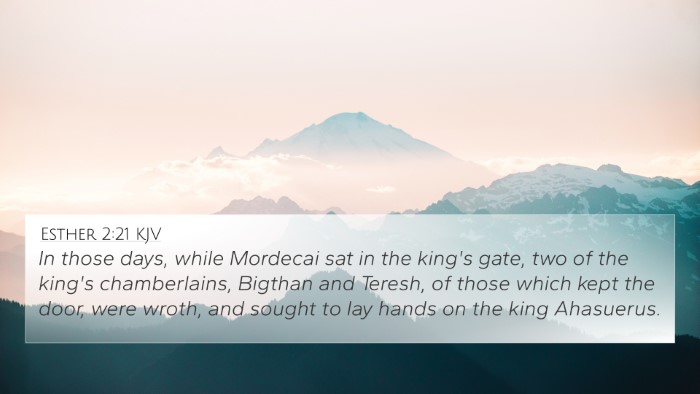
Esther 2:21 (KJV) »
In those days, while Mordecai sat in the king's gate, two of the king's chamberlains, Bigthan and Teresh, of those which kept the door, were wroth, and sought to lay hands on the king Ahasuerus.
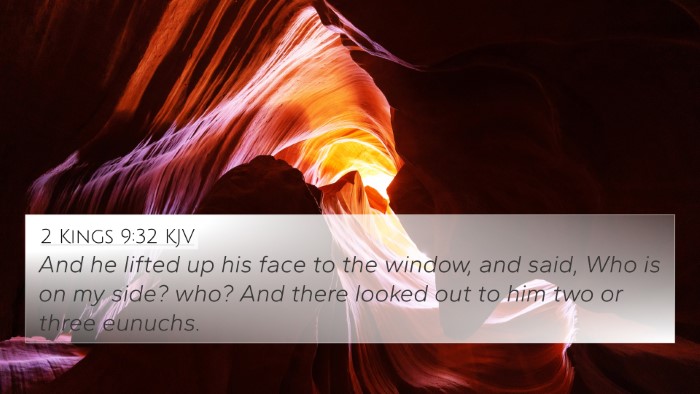
2 Kings 9:32 (KJV) »
And he lifted up his face to the window, and said, Who is on my side? who? And there looked out to him two or three eunuchs.
Esther 7:9 Verse Analysis and Similar Verses
Understanding Esther 7:9
Verse Context: Esther 7:9 states, "And Harbona, one of the eunuchs who served the king, said, 'Look, the gallows standing at Haman's house, fifty cubits high, which Haman made for Mordecai, who spoke good on the king's behalf!' And the king said, 'Hang him on it!'" This passage captures a pivotal moment in the narrative of Esther, showcasing ultimate justice and divine retribution against Haman, the antagonist.
Commentary Overview
This verse can be appreciated through the insights of several respected commentators:
- Matthew Henry: He emphasizes the role of divine providence in the execution of justice. Henry notes that Haman built the gallows for Mordecai, only to face the very death he had intended for his enemy. This indicates a moral reversal—suggesting that those who plot harm against the innocent will often find themselves ensnared by their own schemes.
- Albert Barnes: Barnes discusses the implications of Harbona’s announcement to the king, suggesting that it is a manifestation of Haman's downfall. This verse highlights that those who serve the king (or God) may find themselves in positions to reveal truth, underscoring the importance of loyalty and integrity in royal service.
- Adam Clarke: Clarke gives detailed attention to the cultural and historical context. He points out that gallows during the Persian Empire symbolized a place of shame and death but also served as a dramatic climax to the tension built throughout Esther's story. Clarke suggests that God’s justice is often executed not just in quiet ways but through public and humiliating means for the oppressors.
Thematic Connections and Cross References
The scripture in Esther 7:9 provides ample opportunities for thematic connections throughout the Bible. Below are some related Bible verses that encapsulate similar themes of justice, divine retribution, and the overturning of evil:
- Proverbs 26:27: "Whoever digs a pit will fall into it; if someone rolls a stone, it will roll back on them." - This proverb emphasizes the self-defeating nature of malice.
- Galatians 6:7: "Do not be deceived: God cannot be mocked. A man reaps what he sows." - This New Testament verse aligns with the principle of divine justice present in Esther.
- Psalms 7:15-16: "Whoever digs a hole and scoops it out falls into the pit they have made." - Similar in theme, this emphasizes the consequences of plotting evil against others.
- Job 4:8: "As I have observed, those who plow evil and those who sow trouble reap it." - This verse connects the idea of actions resulting in natural consequences.
- Matthew 7:2: "For in the same way you judge others, you will be judged, and with the measure you use, it will be measured to you." - This admonition from Jesus also points to the reciprocal nature of justice.
- Jeremiah 17:10: "I the Lord search the heart and examine the mind, to reward each person according to their conduct, according to what their deeds deserve." - God’s judgment is thorough and impartial.
- Revelation 18:20: "Rejoice over her, you heavens! Rejoice, you people of God! Rejoice, apostles and prophets! For God has judged her with the judgment she imposed on you." - This reflects the theme of ultimate justice at the end of times.
Summary of Insights
The studied passage of Esther 7:9 stands as a reminder of the overarching narrative of justice found throughout scripture. This crucial moment not only serves to conclude Haman's treachery but also illustrates God's providential hand in guiding events for the good of His people. Each commentator brings a unique perspective, providing depth to our understanding of divine justice:
- Divine Justice: The expectation of retributive justice as demonstrated through the downfall of Haman.
- God's Sovereignty: God orchestrates the events leading to the downfall of the wicked while delivering His faithful servants.
- Human Agency: The role of individuals like Harbona highlights how God's plans often unfold through the actions of people.
- Cultural Context: Understanding the cultural significance of gallows sheds light on the gravity of Haman's fate and its implications for justice.
Practical Application
For those seeking to deepen their understanding of biblical texts and the connections between verses, employing tools for Bible cross-referencing can enhance your study. Consider the following:
- Bible Concordance: A reference tool that allows you to locate verses by keywords, providing insight into broader themes.
- Cross-Reference Bible Studies: Practicing cross-referencing can illuminate relationships between different scripture passages.
- Bible Reference Resources: Utilize various Bible commentaries and reference materials to gain deeper insights.
- Comparative Bible Verse Analysis: Engaging in comparative studies can enhance understanding of specific themes, such as justice or mercy.
Conclusion
Esther 7:9 serves not only as a pivotal moment in Jewish history but also relating to broader biblical themes that resonate through the entirety of scripture. In understanding these verses in context and cross-referencing them, we gain insights into the unchanging nature of God’s justice and the importance of integrity in our actions. As you continue your own biblical journey, consider how these connections and teachings apply to your life today.
